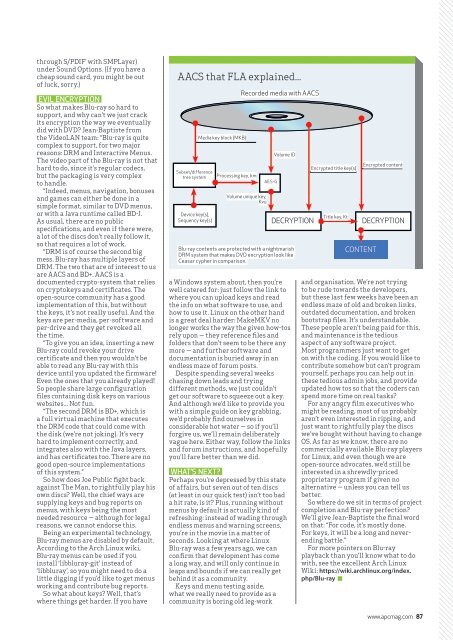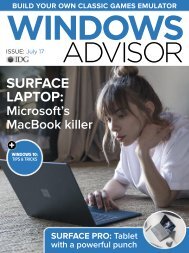Create successful ePaper yourself
Turn your PDF publications into a flip-book with our unique Google optimized e-Paper software.
through S/PDIF’ with SMPLayer)<br />
under Sound Options. (If you have a<br />
cheap sound card, you might be out<br />
of luck, sorry.)<br />
EVIL ENCRYPTION<br />
So what makes Blu-ray so hard to<br />
support, and why can’t we just crack<br />
its encryption the way we eventually<br />
did with DVD? Jean-Baptiste from<br />
the VideoLAN team: “Blu-ray is quite<br />
complex to support, for two major<br />
reasons: DRM and Interactive Menus.<br />
The video part of the Blu-ray is not that<br />
hard to do, since it’s regular codecs,<br />
but the packaging is very complex<br />
to handle.<br />
“Indeed, menus, navigation, bonuses<br />
and games can either be done in a<br />
simple format, similar to DVD menus,<br />
or with a Java runtime called BD-J.<br />
As usual, there are no public<br />
specifications, and even if there were,<br />
a lot of the discs don’t really follow it,<br />
so that requires a lot of work.<br />
“DRM is of course the second big<br />
mess. Blu-ray has multiple layers of<br />
DRM. The two that are of interest to us<br />
are AACS and BD+. AACS is a<br />
documented crypto-system that relies<br />
on cryptokeys and certificates. The<br />
open-source community has a good<br />
implementation of this, but without<br />
the keys, it’s not really useful. And the<br />
keys are per-media, per-software and<br />
per-drive and they get revoked all<br />
the time.<br />
“To give you an idea, inserting a new<br />
Blu-ray could revoke your drive<br />
certificate and then you wouldn’t be<br />
able to read any Blu-ray with this<br />
device until you updated the firmware!<br />
Even the ones that you already played!<br />
So people share large configuration<br />
files containing disk keys on various<br />
websites... Not fun.<br />
“The second DRM is BD+, which is<br />
a full virtual machine that executes<br />
the DRM code that could come with<br />
the disk (we’re not joking). It’s very<br />
hard to implement correctly, and<br />
integrates also with the Java layers,<br />
and has certificates too. There are no<br />
good open-source implementations<br />
of this system.”<br />
So how does Joe Public fight back<br />
against The Man, to rightfully play his<br />
own discs? Well, the chief ways are<br />
supplying keys and bug reports on<br />
menus, with keys being the most<br />
needed resource — although for legal<br />
reasons, we cannot endorse this.<br />
Being an experimental technology,<br />
Blu-ray menus are disabled by default.<br />
According to the Arch Linux wiki,<br />
Blu-ray menus can be used if you<br />
install ‘libbluray-git’ instead of<br />
‘libbluray’, so you might need to do a<br />
little digging if you’d like to get menus<br />
working and contribute bug reports.<br />
So what about keys? Well, that’s<br />
where things get harder. If you have<br />
AACS that FLA explained...<br />
Subset/difference<br />
tree system<br />
Device key(s),<br />
Sequency key(s)<br />
Media key block (MKB)<br />
Processing key, km<br />
Recorded media with AACS<br />
Volume unique key,<br />
Kvu<br />
AES-G<br />
Volume ID<br />
a Windows system about, then you’re<br />
well catered for: just follow the link to<br />
where you can upload keys and read<br />
the info on what software to use, and<br />
how to use it. Linux on the other hand<br />
is a great deal harder: MakeMKV no<br />
longer works the way the given how-tos<br />
rely upon — they reference files and<br />
folders that don’t seem to be there any<br />
more — and further software and<br />
documentation is buried away in an<br />
endless maze of forum posts.<br />
Despite spending several weeks<br />
chasing down leads and trying<br />
different methods, we just couldn’t<br />
get our software to squeeze out a key.<br />
And although we’d like to provide you<br />
with a simple guide on key grabbing,<br />
we’d probably find ourselves in<br />
considerable hot water — so if you’ll<br />
forgive us, we’ll remain deliberately<br />
vague here. Either way, follow the links<br />
and forum instructions, and hopefully<br />
you’ll fare better than we did.<br />
WHAT’S NEXT?<br />
Perhaps you’re depressed by this state<br />
of affairs, but seven out of ten discs<br />
(at least in our quick test) isn’t too bad<br />
a hit rate, is it? Plus, running without<br />
menus by default is actually kind of<br />
refreshing: instead of wading through<br />
endless menus and warning screens,<br />
you’re in the movie in a matter of<br />
seconds. Looking at where Linux<br />
Blu-ray was a few years ago, we can<br />
confirm that development has come<br />
a long way, and will only continue in<br />
leaps and bounds if we can really get<br />
behind it as a community.<br />
Keys and menu testing aside,<br />
what we really need to provide as a<br />
community is boring old leg-work<br />
DECRYPTION<br />
Blu-ray contents are protected with a nightmarish<br />
DRM system that makes DVD encryption look like<br />
Ceasar cypher in comparison.<br />
Encrypted title key(s)<br />
Title key, Kt<br />
CONTENT<br />
Encrypted content<br />
DECRYPTION<br />
and organisation. We’re not trying<br />
to be rude towards the developers,<br />
but these last few weeks have been an<br />
endless maze of old and broken links,<br />
outdated documentation, and broken<br />
bootstrap files. It’s understandable.<br />
These people aren’t being paid for this,<br />
and maintenance is the tedious<br />
aspect of any software project.<br />
Most programmers just want to get<br />
on with the coding. If you would like to<br />
contribute somehow but can’t program<br />
yourself, perhaps you can help out in<br />
these tedious admin jobs, and provide<br />
updated how tos so that the coders can<br />
spend more time on real tasks?<br />
For any angry film executives who<br />
might be reading, most of us probably<br />
aren’t even interested in ripping, and<br />
just want to rightfully play the discs<br />
we’ve bought without having to change<br />
OS. As far as we know, there are no<br />
commercially available Blu-ray players<br />
for Linux, and even though we are<br />
open-source advocates, we’d still be<br />
interested in a shrewdly-priced<br />
proprietary program if given no<br />
alternative — unless you can tell us<br />
better.<br />
So where do we sit in terms of project<br />
completion and Blu-ray perfection?<br />
We’ll give Jean-Baptiste the final word<br />
on that: “For code, it’s mostly done.<br />
For keys, it will be a long and neverending<br />
battle.”<br />
For more pointers on Blu-ray<br />
playback than you’ll know what to do<br />
with, see the excellent Arch Linux<br />
Wiki: https://wiki.archlinux.org/index.<br />
php/Blu-ray<br />
www.apcmag.com 87


















